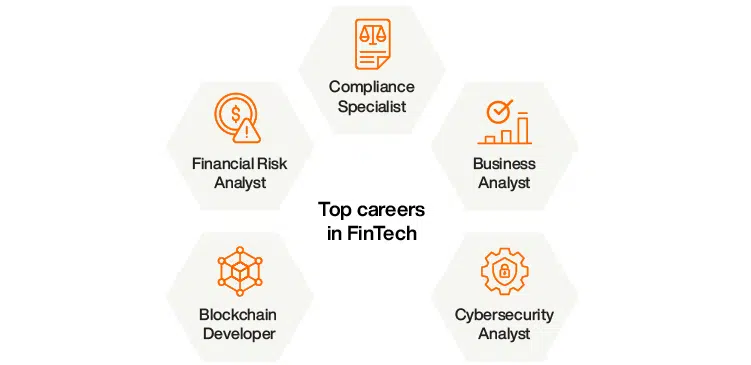Listen to this blog
FinTech has evolved over time, delivering individuals with a straightforward, quicker, less expensive, and more practical means of procuring financial offerings while fostering digital inclusion. This industry is perpetually growing around the world, and India has also witnessed an uptick in expansion. Emerging technologies, changing consumer behavior, and growing investor interest have all fueled the meteoric rise of the FinTech industry. According to estimates, the future Indian FinTech business is estimated to bring in $200 billion by 2030.
As the industry evolves, additional expertise is required, which demands a workforce with the right training to bolster the sector’s advancement. It is anticipated that this growth orbit will continue, producing a favorable environment for professionals looking for job opportunities in this sector. Additionally, job opportunities in the digital age for FinTech professionals come with alluring compensation packages. FinTech offers a dynamic environment enabling individuals to flourish and shape the trajectory of finance.
Read more: Mapping the surge in fintech startups in India
Top FinTech jobs to pursue
Growth potential in FinTech careers is substantial that allures individuals towards various positions in this domain. Promising careers in FinTech include the following.

- Blockchain developer:
The task of developing, generating, and implementing blockchain solutions falls under the purview of a blockchain developer. They work on developing smart contracts and decentralized applications and boosting the effectiveness and security of current blockchain systems. Programming, bug fixing, and collaborating with cross-functional teams are some of their duties as they strive to integrate blockchain technology into different financial procedures. The highest estimated salary of a blockchain developer is ₹ 19.0 Lakhs.
- Quantitative analyst:
A quantitative analyst, commonly referred to as quant, uses statistical and mathematical techniques on financial data to create models and trading and investment strategies. They perform risk analysis, design algorithms, analyze big databases, and offer insights to help investors make the best possible investment choices. They frequently collaborate closely with traders and portfolio managers. The highest estimated salary of a quantitative analyst is ₹ 34.8 Lakhs.
- Cybersecurity expert:
In the FinTech sector, a cybersecurity expert is in charge of shielding infrastructure, data, and financial systems against online attacks. They develop and execute safety protocols, keep an eye out for system flaws, carry out risk analyses, and manage security occurrences. These experts collaborate directly with IT teams, regulatory officials, and upper management to ensure data safety and uphold regulatory compliance. The highest estimated salary of a cybersecurity expert is ₹ 24.0 Lakhs.
- Financial analyst:
A financial analyst is essential for analyzing financial data, performing research, and offering analysis to promote investment choices. They examine financial statements, evaluate market trends, create financial models, and offer suggestions for improving financial performance. Investment bankers, portfolio managers, and other stakeholders are frequently close associates of financial analysts. The highest estimated salary of a financial analyst is ₹ 12.3 Lakhs.
- Data analyst:
A data analyst is tasked with gathering, compiling, and analyzing massive datasets to derive actionable insights. They employ statistical tools, data visualization methods, and machine learning algorithms to find trends, correlations, and patterns in financial data. Additionally, this personnel enables the development of data-driven models and strategic decision-making. The highest estimated salary of a data analyst is ₹ 12.0 Lakhs.
- Compliance manager:
A compliance manager ensures that a FinTech company complies with legal obligations and professional norms. They create and administer compliance programs, carry out risk analyses, keep surveillance for suspicious activity in transactions, and give advice on compliance-related issues. Compliance managers collaborate closely with legal departments, higher-ups, and regulators to preserve a lawful and morally upright workplace. The highest estimated salary of a compliance manager is ₹ 25.0 Lakhs.
Read more: Emerging trends in corporate finance
How to start your FinTech career
There are a few essential steps you may take to start a successful FinTech career. Here is an easy-to-follow outline on how to enter the FinTech industry:
- Pursue a master’s degree or certification:
Consider earning a master’s degree with a FinTech specialization in a relevant discipline, including finance, business management, or computer science. Alternatives include choosing industry-specific credentials like CBP (Certified Blockchain Professional) or CFTP (Certified FinTech Professional). These credentials show that you’re dedicated to exploring everything you need to know about the FinTech industry.
- Stay abreast of FinTech trends:
The FinTech scene is continually changing with changes in regulations and technological breakthroughs. Utilize credible industry journals, academic papers, relevant conferences, and webinars to stay up-to-date on the most recent trends, developments, and market dynamics. This will demonstrate your zeal for the field and commitment to keeping up with FinTech’s rapid-fire evolution.
- Acquire key FinTech skills:
Develop a broad repertoire of skills that integrates technological and financial expertise. The ability to program in languages like Python and R, analyze and visualize data, and comprehend blockchain technology, machine learning, AI, cybersecurity, and financial modeling are just a few instances of vital talents. Your marketability and productivity as a FinTech practitioner will rise with ongoing learning and executing these abilities.
- Build your professional network:
Every field, including FinTech, depends extensively on networking. Attend industry events, join FinTech-related associations, and engage on professional networking sites like LinkedIn to forge contacts with experts in the field, mentors, and peers. Developing a solid professional network may unlock avenues to favorable possibilities, collaborations, and valuable insights into the FinTech industry.
In-demand FinTech skills to have
Certain skills have become extremely valuable and in demand for individuals looking to succeed in the FinTech sector. These are the top five skills required for FinTech careers, along with a description of each:
- Data analysis:
The ability to collect, analyze, and draw conclusions from huge data sets is an important aspect of data analysis skills. For the sake of comprehending patterns, trends, and consumer behavior, competence in statistical analysis, data visualization, and data modeling approaches is a must. Data analysis assists well-informed decision-making, risk evaluation, and the formulation of data-driven corporate growth strategies.
- AI & ML:
The FinTech industry is undergoing a paradigm shift thanks to AI and ML technologies, which automate procedures, enhance client experiences, and improve risk management. Mastering algorithms, data preprocessing, choosing models, and evaluation strategies are prerequisites for AI and ML proficiency. These skills make it possible to create and deploy personalized suggestions, chatbots, fraud detection systems, and predictive models, among other things.
- Cybersecurity:
Robust cybersecurity solutions are imperative as the FinTech sector manages private financial data. Expertise in encryption, secure coding techniques, network safety, and risk management are all part of the discipline of cybersecurity. Cybersecurity experts can maintain regulatory compliance, safeguard financial data and systems from cyber attacks, and mitigate any risks related to data breaches or unauthorized access.
- Blockchain expertise:
In the FinTech sector, blockchain technology has become extremely prevalent owing to the potential of encrypted and transparent transactions. Learning the technology of distributed ledgers, smart contracts, and cryptographic principles inside and out is crucial for adeptness in the blockchain. Blockchain expertise makes it possible to create decentralized financial applications, online identity authentication, supply chain monitoring, and effective cross-border payments.
- DevOps:
The incorporation of DevOps techniques enables more efficient collaboration and quicker deployment of financial apps and systems by bridging the gap between software creation and operations. CI/CD (Continuous integration/continuous deployment) procedures, infrastructure automation, containerization, and cloud computing platforms are all necessary for DevOps proficiency. In the FinTech sector, DevOps expertise improves agility, scalability, and reliability.
Read more: Why BFSI professionals should stay abreast of trends in banking
Top FinTech companies in India
Discussed below are some of the top FinTech companies in India that offer various lucrative opportunities for professionals.
- Razorpay: Razorpay provides online payment solutions and subscription billing services for businesses.
- Cred: Cred is a credit card management platform that offers rewards for timely bill payments and expense tracking.
- BharatPe: BharatPe provides simplified digital payments for small merchants with UPI QR code-based payments, credit services, and POS machines.
- PhonePe: PhonePe is a digital payments platform that enables users to make payments, transfer funds, and recharge mobiles.
- Groww: Groww is an investment and wealth management platform that allows retail investors to invest in mutual funds, stocks, and gold.
- ClearTax: ClearTax offers technology-driven tax filing and compliance solutions, simplifying income tax and GST processes.
- Mintify: Mintify provides a mobile app for personal finance management, helping users track expenses, set budgets, and gain insights.
- Insurance Dekho: Insurance Dekho is an online platform that enables individuals and businesses to compare and purchase insurance policies.
- KreditBee: KreditBee offers digital lending solutions, providing instant personal loans and education loans to young professionals.
- Pine Labs: Pine Labs specializes in payment and merchant commerce solutions, offering POS systems, payment acceptance, and loyalty programs.
Read more: How TAPMI’s online MBA-BKFS helps pursue managerial careers in corporate finance
Become future-ready with our online MBA program












